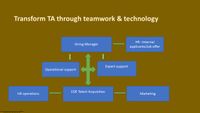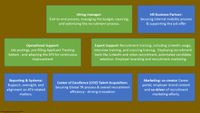Redesign Talent Acquisition - Time to re-think your Recruitment Function?
Imagine a world where managers are fully equipped to lead recruitment, selecting candidates who not only meet the qualifications but also fit seamlessly into the team culture.
A world where managers are accountable for every hire, fostering a deeper sense of ownership and dedication to team success.
This vision is not just an idealistic dream; it’s a bold and transformative move that promises a more cohesive, agile, and strategically aligned organization.
Charles Darwin's words resonate here: "It is not the most intellectual of the species that survives; it is not the strongest that survives; but the species that survives is the one that is able best to adapt and adjust to the changing environment in which it finds itself."
Is it Time to Bring Recruitment Accountability Back to Business Operations?
When I started my career, recruitment departments didn’t exist in the form we see today. Instead, the responsibility lay with managers and HR departments. In my early years as a manager, I led a team of over 50 team members. Filling vacancies was my responsibility, albeit with support from HR. Additionally, I was accountable for the advancement and development of my team members. Today, many companies are asking a critical question: Is the recruitment function able to survive?
A Radical Rethink
Consider this: is the recruitment function able to survive in its current form?
What if the future of recruitment lies not in a specialized department, but in the very hands of those who will lead, mentor, and grow their teams? By shifting the responsibility to managers, we not only streamline the process but also integrate it more closely with business objectives.
We are at a crossroad. We can continue to invest in a traditional recruitment model that struggles to adapt, or we can embrace a new paradigm that places trust and accountability directly with our managers. It’s a call to adapt, to evolve, and to rethink the way we build our teams.
Why Managers Should Lead Recruitment
Core Managerial Responsibility: Recruitment and team building are fundamental managerial responsibilities. A manager's core role includes assembling, developing, and leading a high-performing team. By integrating recruitment into core business operations, we empower managers to play an active role in building their teams.
Fostering Accountability: Reintegrating recruitment into business operations enhances the sense of ownership among managers, making them directly accountable for the quality of talent brought into their teams. This alignment encourages them to be more invested in the recruitment process and make well-informed decisions, thus contributing to a more cohesive and effective team.
Leveraging Unique Insights: Managers are the architects of their teams' success. By training them in recruitment, they can leverage their unique insights and expertise to attract the best-fit candidates, ensuring teams are well-positioned for achievement and growth.
Business Perspective
Deeper Understanding of Team Dynamics Managers intimately understand their team's needs, dynamics, and culture. They know the skills and personalities that will mesh well with their existing team members. When managers are directly involved in recruitment, they can make more informed decisions that lead to better team cohesion and performance.
Enhanced Accountability When managers are responsible for both hiring and team development, they have a vested interest in the success of their hires. This accountability ensures that they are not just filling a position but also considering the long-term growth and development of the team. It creates a sense of ownership that is often missing in recruitment departments.
Improved Speed and Efficiency Recruitment departments can sometimes add layers of bureaucracy, slowing down the hiring process. By empowering managers to handle recruitment, the process can become more agile and responsive to immediate needs. This can be particularly beneficial in fast-paced industries where timing is crucial.
Alignment with Business Goals Managers are directly aligned with the strategic goals of their departments. They understand the specific skills and expertise needed to achieve these goals. By taking charge of recruitment, managers can ensure that new hires are not just qualified but also aligned with the strategic direction of the business.
Development of Leadership Skills Involving managers in recruitment enhances their leadership skills. It forces them to think critically about team composition, talent development, and long-term planning. These are essential skills for any leader and contribute to their overall growth and effectiveness.
Empowering Managers with Skills and Knowledge Empowering our hiring managers with the skills and knowledge to actively lead the recruitment process and source candidates is essential. This leverage of their expertise enhances the quality of candidates attracted.
A Call to Action
Can we trust managers to step up and take on this critical role? It’s a bold and transformative move, but one that promises a more cohesive, agile, and strategically aligned organization.
Let’s challenge the status quo and rethink the future of recruitment. Is it time for a change? What if this change could lead to teams that are more dynamic, engaged, and aligned with the company’s vision from day one?
You don't have to agree, but perhaps this might spark a thought or inspire a different way of looking at how we position and structure recruitment. The time for change is now. What are your thoughts?
Maybe also interesting?
Register now to stay informed and grow maturity






